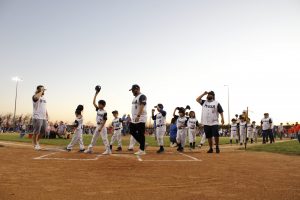By Moses Leos III
The Hays Youth Sports Complex may not have been born in a cornfield — it was actually built in a cotton field. But for Mike Dees, Billy Gandy and Robert Roach, building a facility for Hays County youth to play sports was their very own Field of Dreams.
“It was a great reward for the eight or ten of us that put a lot of time into it,” Roach said. “It was great to see the kids having somewhere [local] to play. Otherwise, we would’ve had to spread out to the other communities to play organized sports.”
The concept of Hays County organized youth sports began in 1973. Gandy, who coached in the Manchaca Youth Optimist League, was asked to field several teams in the Buda area.
Over a two-year span, the league grew to ten teams, three managed by Gandy. But the league was steadily outgrowing its home at the old Buda High football field —where today sits the lower campus of Buda Elementary School.
A search for a more suitable location took root. The three, led by Dees, didn’t have to look far. Bob Barton, publisher with his parents, Bob and Mary Barton, of what was then known as Hays County Free Press, owned a cotton field along FM 2770.
“It was a good cotton field that Bob didn’t need anymore. He didn’t want to farm it,” Dees said. “It was a good flat piece of property.”
Under the condition of using it for the kids, Barton offered them a deal they couldn’t refuse — a donation of 10 acres, if they purchased 10 acres first.
The trio made a mad rush to the Kyle State Bank, where they applied for a $44,000 loan that kick started their vision of a ball field.
They then split duties and formed the Hays Youth Athletic Association (HYAA). Dees worked on the legal side.
Prior to the purchase of the land, Dees recruited officers for the HYAA board, along with support from the community. He held a “meeting per week” to gauge where parents were on the idea.
With the help of “a good attorney,” Dees composed a bill of rights for the board. He then worked on documents to secure a 501c3 non-profit status for the organization. They were the first non-Optimist organization in the county to gain non-profit status.
“It probably took three to four days to draw up [the bill of rights],” Dees said. “We went to the IRS and got it all submitted. It took a couple of weeks to get it all done permanently.”
Meanwhile, Roach oversaw construction.
He acquired machinery and assistance from neighboring Texas Cement. With the help of ten to 15 volunteers, Roach took six months to finish the project.
“That took a lot of time to build backstops, do grounds keeping [work] and get the field ready to play baseball,” Roach said.
As the HYAA began holding games, Gandy took the final role as the primary fundraiser for the organization.
He did so amid several other roles he played, including coach and umpire.
The request was simple enough — $100 bought a lifetime membership.
“I knocked on every door and every business in Hays County over the next three years,” Gandy said. “During all of that time, I never had anyone that said no or turn us away. They knew what we were doing and they were in favor of it.”
The organization took off from there. Based on the prospect of “giving kids something to do,” the HYAA drew athletes from all corners of Hays County. With the addition of soccer fields, the HYAA began to grow. Registrants swelled to over 300 kids within the first year.
Lights were installed years later, while shade structures were built in 2000 with help from the Lower Colorado River Authority.
While growth occurred, the credo remained the same — giving all kids a chance to play.
“It’s in our bylaws where no could kid could be turned away, whether they could pay or not,” Gandy said. “Every kid could play [sports].”
Today, the Hays Youth Sports Complex, which houses the Hays Youth Softball and Baseball Association (HYBSA) and several other organizations, sees more than 3,000 kids play on its fields each year.
“As the years have gone by, soccer has become more popular,” HYBSA chairman Jeff Reeves said. “The baseball league attracts kids. There are enough leagues, not just baseball, to kind of spread the kids around.”
All three founders have since gone their separate ways. Some stayed on and watched from afar. Others kept their distance and continued their day jobs.
But they look back knowing they made an impact on Hays County youth.
“The overall goals of what we had changed over the years. Everything has to change, but we started out small, but we grew with it to a point,” Roach said. “When we got out, we knew it was going to continue to grow.”





